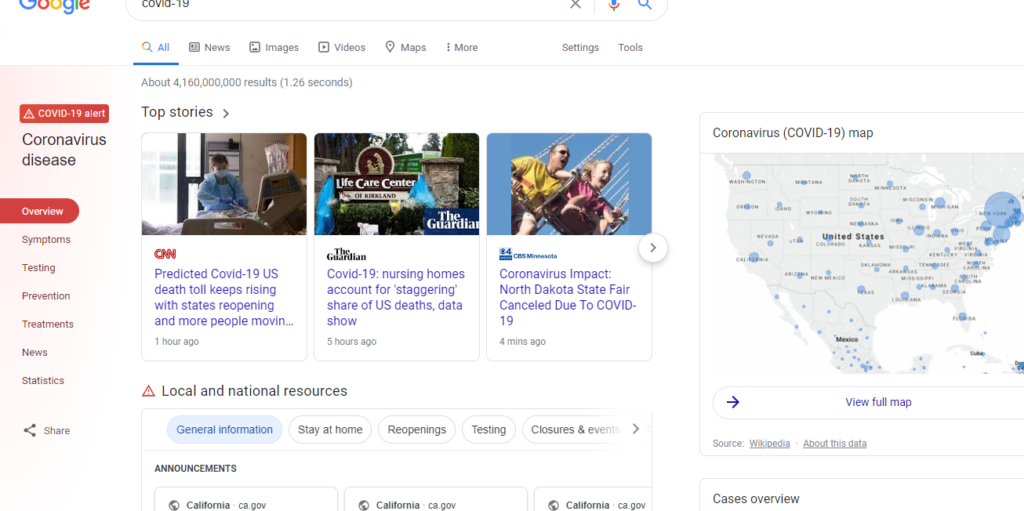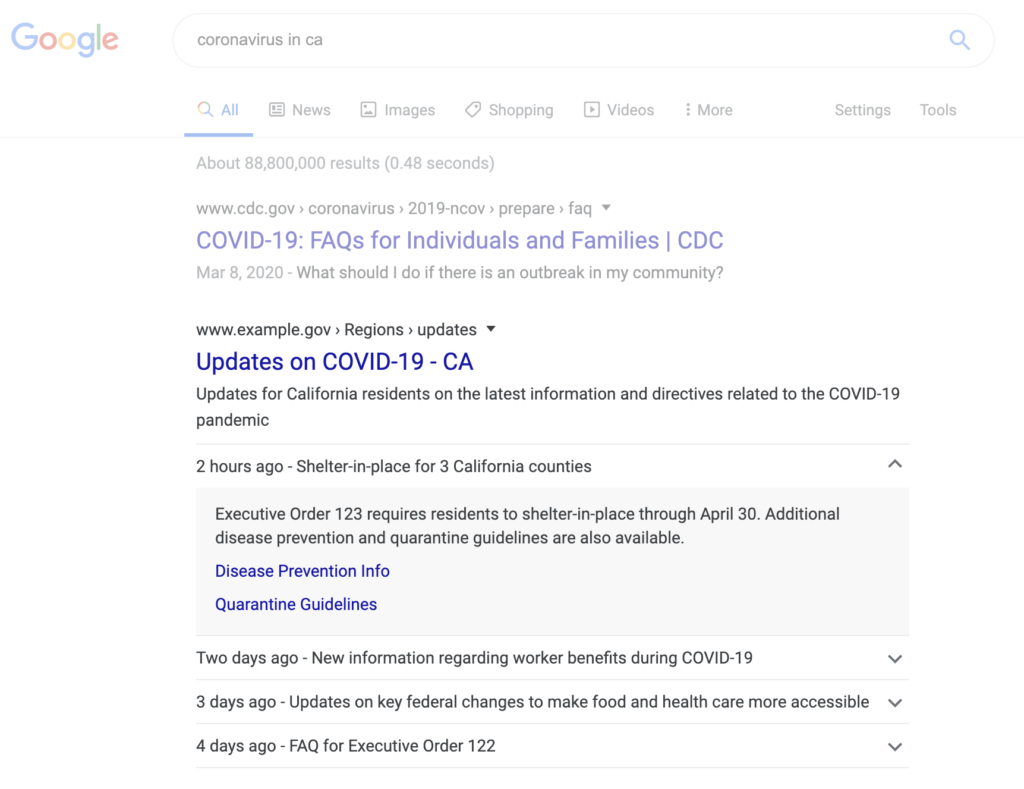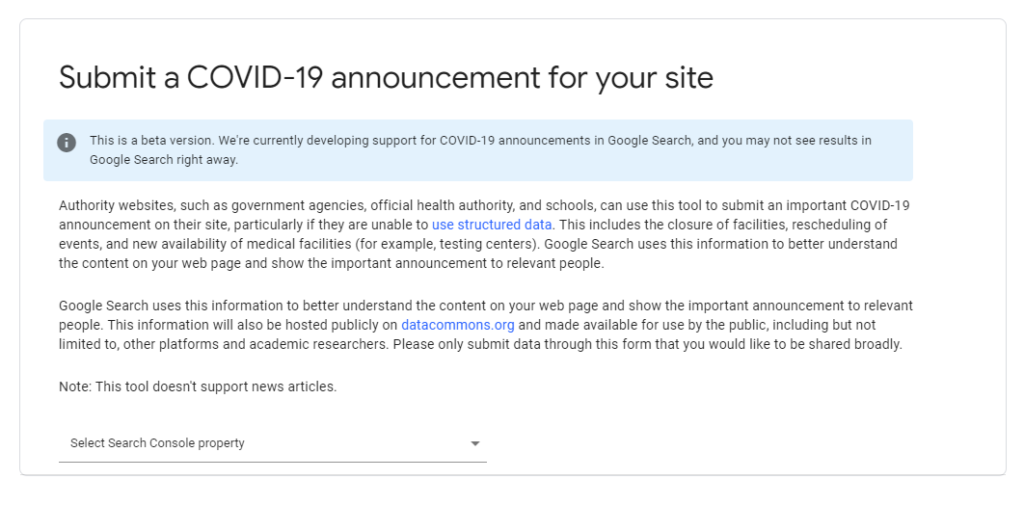(Nearly) Every Google COVID-19 Resource for Marketers
With Covid-19 related shutdowns across the country and across the world, many websites and businesses are struggling to stay up. Navigating digital strategies, marketing campaigns, and SEO practices is difficult for websites that are faced with unprecedented realities.
Google has responded by creating a litany of resources, tools, and best practice guides for websites and businesses looking to respond the best they can. In fact Google has built a wide range of resources designed for everything from regular eCommerce sites to NGOs, schools, healthcare sites, brick-and-mortar businesses, event hosts, YouTubers, and more.
We’ve collected them all here (nearly). Browse through these Covid-19 tools and resources from Google to see how they can help you with marketing, site health, information for individuals, and more. These resources can be critical for all sorts of websites and organizations looking to provide valuable public resources during the pandemic. It also outlines resources that can be useful for eCommerce sites, B2B businesses, retailers, and websites looking to maintain their search presence.
Read through our list of Google resources and tools designed for marketers and websites.
- Rich Results on the SERP
Google responded to the deluge of information on Covid-19 by altering its SERP design to provide extra resources for searchers looking to learn more. The new desktop search results page features a map for coronavirus cases, and the left-side rail menu shows searchers new tabs for information on symptoms, testing, treatments, statistics, and more.
Anyone typing in a Covid-19 related search query into the Google search bar should be able to find the updated SERP.

- Covid-19 Resources Landing Page
Google also gave web users a landing page directly on their site for official information on Covid-19.
This landing page offers several tabs where visitors can see information, insights, and get resources from 3rd parties across the web on staying safe and healthy. Resources are broken down by use or need with information specifically available for journalists, educators, businesses, non-profits, financially struggling individuals, and more.
- Guidance for Businesses affected by COVID-19
In the My Business section of the support.google.com site Google has provided information on how businesses can address the effects of coronavirus.
This feature is specifically designed for businesses that have accounts on the Google My Business platform and it gives best practices for businesses that need to update their hours of operation or notate expected delays, extra services, and even temporary closures.
Google says, “Marking your business ‘Temporarily closed’ won’t affect local search ranking and it will be treated similarly to open businesses. Businesses offering pickup or delivery services should not mark the business ‘Temporarily closed,’ otherwise those services won’t show on Google.”
Keep in mind that changes made through Google My Business may take some time to take effect. The updates will show on your Business Profile on Google Search and in Google Maps.
- Structured Data Specifically for Covid-19
In early April Google announced support for structured data relating to Covid-19 special announcements.
The structured data system was announced for health and government related sites and is also included in a report that can be used in Search Console’s enhancements section for webmasters wanting to know how their structured data was being rendered.
Sites looking to use this schema can add “SpecialAnnouncement” data markup to their site, or they can submit announcements directly through Search Console.

- Google Ads Credits for Businesses Hurt by Covid-19
Google opted to help eligible small and medium-sized businesses (SMBs) with free ads credits to help them reach customers. Google’s credits added up to a total of $340 million dollars of credits for their sites using their Ads platform – which is all available for future ad spend until the end of 2020.
The ads credit would be available to businesses who have used Google Ads before in ten out of the twelve months of 2019 and in January/February of 2020. This also includes Google Ads partners that are eligible or businesses that advertise through a partner such as an advertising agency.
They will be available across the Google Ads network including on Search ads, Display ads, and Youtube.
The credits will be applied to billed/invoiced past or current Google Ads spend automatically sometime around late May.
- Google for Small Business Covid-19 Landing Page
To demonstrate their commitment to SMBs Google’s Small Business subdomain has been updated with information on how smaller businesses can approach the pandemic related down-turn.
Here they lay out some recommended practices for sites to update their Google My Business profile, adjust Ads campaigns, and on methods for running businesses remotely. They also provide a guide for businesses trying to “Navigate the road head” with information like insights on user behavior changes, assessing impact of the pandemic on SMBs, and how to take action.
- Google Ads Help for Covid-19
Marketers and advertisers with ads campaigns can take advantage of Google’s pandemic resources designed to help them navigate the coronavirus shutdown. The support.google.com troubleshooting domain includes guidance on how to evaluate and adjust ads during this time.
Here they outline steps for:
- Evaluating ad language, tone, ad multi-media, and advertised business practices during the pandemic.
- Adapting ads to “dynamic market conditions.” Meaning that advertisers should be prudent in managing their ads in accordance with changing bid amounts, changing keyword traffic, and taking advantage of resources that are suitable for remote work, like with the mobile Ads app.
- Search Console’s Covid-19 Announcement Tool
Mentioned above as part of Google’s effort to make structured data available for the pandemic, the search engine company has also given marketers away to manage their SEO through the Search Console portal with the “Covid-19 Announcement Submission Tool.”
The tool is available to government agencies, official health organizations, and schools only, so it won’t be available as much to private businesses and commerce websites. It requires the following
- Announcements must expire within 1 month of posting
- If no expiration date is set for the post then by default it will expire after 7 days
- The tool cannot be used by news organization or for news articles
The announcement types currently supported include:
- Covid-19 Testing Facility
- School Closure
- Shelter in place
- Disease spread statistics
- Travel bans
- Other/general
Learn more about the tool by reading about it here.

- Covid-19 Google Maps Updates Help
Individuals are able to use Google Maps with information from businesses and locations that are affected by the coronavirus pandemic. For information related to COVID-19, they can select the alert on the Google Maps home screen – Google provides a Google Maps Help landing page for this specific topic.
For businesses like brick-and-mortar shops and restaurants this means that they can update their Google Maps presence to cater to changing local conditions. Google has set up an information page on these new map features and has set up a page for businesses with a Google My Business account on how they can take advantage of these updates.
- Best Practice for Health and Government Websites
The search giant also addressed the issue of providing important information and managing SEO for official government and public health websites. They also offered a technical support group for these organizations to seek trouble-shooting and advice.
Visit the Search Console Help site for their best-practices advice on this topic.
Here they explain:
- How to test for users presence and visibility in search
- See how sites are ranking for top queries
- Optimizing site content, titles, and meta tags
- How to see user queries in multiple languages
- Adding structured data to FAQ pages with Covid-19 related info
The technical support group is only available to websites that fit the criteria, and sites that fill out the appropriate form to gain access.
- Pausing Business Online During the Pandemic
For businesses that are unable to main online business operations, fulfill orders, or maintain product stock, Google has provided guidance on how they can maintain the health of their marketing and online business.
Here they outline practices for limiting site visibility, disabling cart functionality, providing structured data and announcements, altering presence in the Google index, and more.
This resource from Google strongly recommends that businesses do not disable their entire website or remove themselves from the index – best practice is to notify customers of suspended operations by keeping the website live to maintain SEO rankings and index presence.
If websites must be shut down (under extreme circumstances) Google recommends the following:
- If you need to urgently disable the site for 1-2 days, then return an informational error page with a 503 HTTP result code instead of all content. Make sure to follow the best practices for disabling a site.
- If you need to disable the site for a longer time, then provide an indexable homepage as a placeholder for users to find in Search by using the 200 HTTP status code.
- If you quickly need to hide your site in Search while you consider the options, you can temporarily remove a website from Search using Search Console.
- Business Strategies & Resources from Think With Google
Marketers and online advertisers may be familiar with the Think With Google site for data-driven insights on business marketing and advertising. Google has updated the site with a range of resources specifically created to address the Covid-19 pandemic’s effects on businesses and retail.
You can learn more about these resources here.
Marketers and business owners who are struggling to adjust their business practices can utilize data and articles from Google experts on how to best manage business strategies during the shutdown.
- Ads Policy Guidance During the Pandemic
Google gave marketers an update on its keyword and ads policy regarding sensitive events. Marketers and advertisers using the Google platform can use resources from the Google Ads Help policy updates landing page for more information.
Google also advises marketers to follow Google’s policy on sensitive events to make sure that their advertising practices do not get their ads blocked. In March Google clarified that any “public health emergency” would fall under this definition.
- Properties for Virtual, Postponed or Cancelled Events
On March 17th, the Google Webmaster Central Blog announced information and resources on how event hosts and event-related businesses can react to Covid-19 related shutdowns.
Google announced they’d be offering structured data and developer documentation markup for the pandemic.
Marketers and advertisers can learn more about the schema markup from the Schema.org website. They can also visit Google’s blog post to learn more about these structured data tools.
This update will allow websites to notify searchers and visitors about changing events status (such as cancellations or venue changes) and with structured data that will appear on the SERP.
- Google Local Ads Updates
For local businesses and organizations, Google has added options for some local businesses to emphasize their services that are offered during the Covid-19 outbreak. Within the Google Local Services Ads you can select, depending on your business type, what levels and types of services you offer.
Read more information about this update here, or visit your Google Ads account to learn more.
Google Local Services ads now offering COVID-19 specific options that a business can choose to highlight on their listing. pic.twitter.com/6eX8dKz6sy
— Tom Waddington (@tomwaddington8) April 20, 2020
- YouTube Help Landing Page for Coronavirus Disease 2019
For marketers utilizing Google Ads across YouTube, Google has provided information here as well. They have provided a regularly updated landing page to give advertisers information on how YouTube is addressing the situation.
This page gives good general information for YouTube creators and links to several other resources and tools that Google is offering for its video site.
- YouTube Giving Fundraising
YouTube creators and marketers who are looking to help support charitable causes can take advantage of Google’s help page on YouTube fundraising.
Eligible channels can fundraise for nonprofits by adding a donate button to their videos and live streams. Viewers can donate directly on the video watch page or in live chat. Visit this page to learn more about how to set up a YouTube Giving fundraiser event.
- YouTube Monetization Policy on Covid-19 Content
For businesses, online marketers, and creators on YouTube that are posting coronavirus and pandemic related content, they should check out Google’s policy information page.
Content with distressing footage, medical misinformation, and pranks are particularly at risk of being demonetized.
Google has created the above resource page to help guide content creators about what is and is not best practice for creating videos about Covid-19.
- Curbside Store Pickup for Google Ads
Google recently started testing a new beta feature for people using local inventory paid ads. They have the opportunity to enhance their ads with a “curbside pickup” badge. PPC advertisers can learn about the new Merchant Center based feature here. According to Google, in order to be eligible you must:
- Enable store pickup
- Provide a curbside or contactless pickup option to shoppers who purchase products on your website and prefer to pick up at your store
- Allow curbside or contactless pickup without requiring shoppers to use an app
Contact Radd Interactive for more information about SEO best practices and paid-advertising services across Google. Our professional analyst team can help you optimize website performance with a free SEO or PPC phone consultation.
